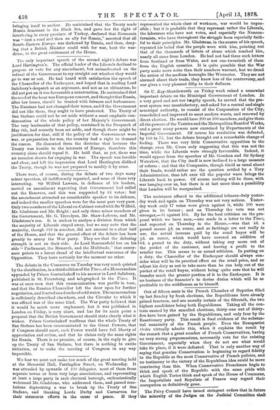The debate in the Commons on Tuesday was very much
quieted by the distribution, in a third edition of the Times, of a Memorandum appended by Prince Gortschakoff to his answer to Lord Salisbury, published in St. Petersburg and telegraphed to the Times. It was at once seen that this communication was pacific in tone, and that the Russian Chancellor left the door open for further negotiation , and it acted as a douche of cold water. The memorandum is sufficiently described elsewhere, and the Circular to which it was affixed was of the same kind. The War party believed that it would be much more unpleasant, but it was published in London on Friday, is very short, and has for its main point a proposal that the British Government should state clearly what it wishes. Prince Gortschakoff reaffirms that the whole Treaty of San Stefano has been communicated to the Great Powers, that if Congress should meet, each Power would have full liberty of appreciation and action, and that he claims only the same rights for Russia. There is no promise, of course, in the reply to give up the Treaty of San Stefano, but there is nothing to excite irritation, or to make the meeting of Congress in any way impossible.


































 Previous page
Previous page